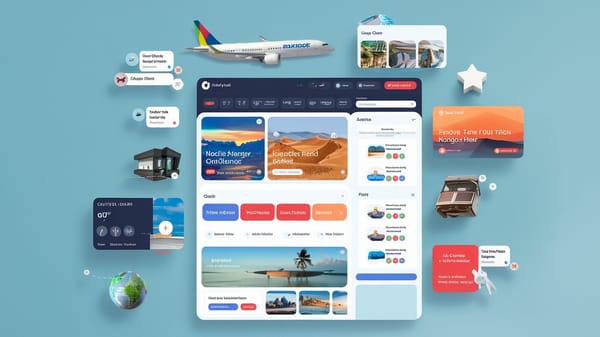Performance Marketing Agencies in the U.S. (2024): An In-Depth Analysis

In 2024, the landscape of performance marketing agencies in the United States is characterized by rapid evolution and heightened competition. As businesses increasingly prioritize measurable outcomes and return on investment (ROI), performance marketing has emerged as a critical component of digital marketing strategies. This report delves into the current state of performance marketing agencies, examining key players, industry trends, and competitive strategies that define the market.
Performance marketing agencies specialize in driving specific actions, such as clicks, leads, or sales, and are compensated based on the results they deliver. This model aligns with the growing demand for accountability and transparency in marketing expenditures. The U.S. market is home to a diverse array of agencies, ranging from large, established firms to nimble startups, each leveraging innovative technologies and data-driven approaches to optimize client campaigns.
Key players in the industry, such as Wpromote and Tinuiti, continue to expand their service offerings, integrating advanced analytics, artificial intelligence, and machine learning to enhance campaign performance. These agencies are at the forefront of adopting new technologies and methodologies, setting benchmarks for others in the industry.
Emerging trends in 2024 include the increasing importance of first-party data, as privacy regulations tighten and third-party cookies phase out. Agencies are investing in robust data management platforms and customer relationship management (CRM) systems to harness and analyze first-party data effectively. Additionally, the rise of omnichannel marketing strategies is prompting agencies to develop cohesive campaigns that seamlessly integrate across various digital and traditional channels.
Competitive strategies among performance marketing agencies are increasingly focused on differentiation through specialization and niche expertise. Agencies are tailoring their services to specific industries or marketing channels, such as social media, search engine marketing, or affiliate marketing, to stand out in a crowded marketplace.
You can also visit Oncely.com to find more Top Trending AI Tools. Oncely partners with software developers and companies to present exclusive deals on their products. One unique aspect of Oncely is its “Lifetime Access” feature, where customers can purchase a product once and gain ongoing access to it without any recurring fees. Oncely also provides a 60-day money-back guarantee on most purchases, allowing customers to try out the products and services risk-free.
Oncely are hunting for the most fantastic AI & Software lifetime deals like the ones below or their alternatives:

Table of Contents
- Understanding Performance Marketing Agencies
- Definition and Core Principles
- Key Services Offered
- Technological Integration and Data Utilization
- Industry Trends and Innovations
- Competitive Landscape and Key Players
- Challenges and Considerations
- Current Trends in U.S. Performance Marketing for 2024
-
- Data-Driven Decision Making
-
- Integration of AI and Machine Learning
-
- Emphasis on Multi-Channel Strategies
-
- Focus on Influencer and Content Marketing
-
- Increasing Importance of Conversion Rate Optimization (CRO)
-
- Challenges and Opportunities for Performance Marketing Agencies
-
- Navigating the Competitive Landscape
-
- Leveraging Advanced Analytics and Technology
-
- Adapting to Evolving Consumer Behavior
-
- Managing Client Expectations and Delivering Results
-
- Expanding Service Offerings and Market Reach
-
Understanding Performance Marketing Agencies
Definition and Core Principles
Performance marketing agencies operate on a results-driven model where compensation is directly tied to the achievement of specific marketing outcomes. This model is distinct from traditional marketing approaches, as it emphasizes accountability and efficiency. Advertisers only pay for measurable results, such as clicks, conversions, or sales, ensuring that marketing budgets are optimized and resources are not wasted. This approach is particularly beneficial in the digital age, where data analytics and technology play a crucial role in tracking and measuring campaign success (Influencer Marketing Hub).
Key Services Offered
Performance marketing agencies offer a range of services designed to drive measurable results. These services often include:
- Search Engine Marketing (SEM): Utilizing paid search strategies to increase visibility on search engines and drive targeted traffic to websites.
- Social Media Advertising: Creating and managing paid campaigns on platforms like Facebook, Instagram, and LinkedIn to engage specific audiences.
- Affiliate Marketing: Partnering with affiliates to promote products or services, with compensation based on performance metrics such as sales or leads.
- Email Marketing: Crafting targeted email campaigns to nurture leads and convert them into customers.
- Influencer Marketing: Collaborating with influencers to reach broader audiences and enhance brand credibility (Business of Apps).
Technological Integration and Data Utilization
Performance marketing agencies leverage advanced analytics and cutting-edge technology to optimize campaigns and maximize return on investment (ROI). By employing data-driven strategies, these agencies can closely monitor ad spend and reallocate resources as needed to achieve the best possible outcomes. Tools such as Google Analytics, Facebook Ads Manager, and various customer relationship management (CRM) systems are commonly used to track performance and make informed decisions (310 Creative).
Industry Trends and Innovations
The performance marketing landscape is continuously evolving, with several key trends shaping the industry in 2024:
-
Increased Focus on Mobile Marketing: As mobile usage continues to rise, performance marketing agencies are prioritizing mobile-first strategies to reach consumers on their preferred devices. This includes optimizing websites for mobile, creating mobile-specific ad campaigns, and utilizing mobile analytics tools to track user behavior.
-
Personalization and Customer Experience: Agencies are increasingly using data to deliver personalized marketing experiences that resonate with individual consumers. This involves tailoring content and offers based on user preferences and behaviors, enhancing customer engagement and satisfaction.
-
Integration of Artificial Intelligence (AI): AI technologies are being integrated into performance marketing strategies to automate processes, predict consumer behavior, and optimize ad targeting. This allows agencies to deliver more precise and effective campaigns.
-
Sustainability and Ethical Marketing: There is a growing emphasis on sustainability and ethical practices within the industry. Agencies are adopting eco-friendly practices and ensuring that their marketing efforts align with consumers' values and expectations (The Social Shepherd).
Competitive Landscape and Key Players
The U.S. performance marketing industry is highly competitive, with numerous agencies vying for market share. Some of the top agencies in 2024 include:
- DataDrivenMinds: Known for its innovative use of data analytics to drive marketing success.
- 310 Creative: Offers a comprehensive suite of performance marketing services with a focus on measurable results.
- Performlytics: Specializes in leveraging technology to optimize marketing campaigns and maximize ROI.
- ROI Masters: Renowned for its strategic approach to performance marketing, delivering impressive results for clients across various industries (310 Creative).
These agencies differentiate themselves through their expertise, innovative approaches, and proven track records in delivering successful digital marketing campaigns. They serve a diverse range of clients, including eCommerce businesses, B2B companies, SaaS providers, and small to medium-sized enterprises (SMBs).
Challenges and Considerations
While performance marketing offers numerous benefits, there are also challenges that agencies and clients must navigate:
-
Data Privacy and Compliance: With increasing scrutiny on data privacy, agencies must ensure compliance with regulations such as the General Data Protection Regulation (GDPR) and the California Consumer Privacy Act (CCPA). This involves implementing robust data protection measures and being transparent about data collection and usage practices.
-
Ad Fraud and Quality Control: Ad fraud remains a significant concern in the digital advertising space. Agencies must employ sophisticated tools and strategies to detect and prevent fraudulent activities, ensuring that marketing budgets are spent effectively.
-
Balancing Short-Term and Long-Term Goals: While performance marketing focuses on achieving immediate results, agencies must also consider long-term brand building and customer relationships. Striking the right balance between short-term performance and long-term growth is crucial for sustained success (Influencer Marketing Hub).
In conclusion, performance marketing agencies in the U.S. are at the forefront of driving measurable results through data-driven strategies and innovative technologies. As the industry continues to evolve, agencies must adapt to emerging trends and challenges to remain competitive and deliver value to their clients.
Current Trends in U.S. Performance Marketing for 2024
1. Data-Driven Decision Making
In 2024, performance marketing agencies in the U.S. are increasingly leveraging data-driven strategies to optimize marketing campaigns and maximize return on investment (ROI). Agencies are utilizing advanced analytics and cutting-edge technology to track and measure the effectiveness of their campaigns in real-time. This approach allows for precise targeting and personalization, ensuring that marketing efforts are directed towards the most promising leads and customer segments. According to Influencer Marketing Hub, these agencies excel in results-driven strategies where compensation is based on the achievement of specific goals, such as leads, sales, or other measurable outcomes.
2. Integration of AI and Machine Learning
Artificial Intelligence (AI) and Machine Learning (ML) are playing a pivotal role in transforming performance marketing strategies. Agencies are employing AI to automate and enhance various aspects of marketing, from customer segmentation to content creation and campaign optimization. AI-driven tools are enabling marketers to predict consumer behavior more accurately and tailor their strategies accordingly. As noted by NoGood, performance marketing is about getting results that matter—tangible outcomes like clicks, leads, and sales. The integration of AI and ML is helping agencies achieve these outcomes more efficiently by providing insights that were previously unattainable.
3. Emphasis on Multi-Channel Strategies
Performance marketing agencies are increasingly adopting multi-channel strategies to reach consumers across various platforms and touchpoints. This approach involves the integration of social media, search engines, email marketing, and other digital channels to create a cohesive and comprehensive marketing strategy. The goal is to engage consumers at different stages of their buying journey and drive conversions through consistent messaging and branding. According to The Social Shepherd, their expertise in driving impactful results, channeling traffic, and seamlessly converting it into valuable sales or leads positions them as ideal partners in achieving digital marketing success.
4. Focus on Influencer and Content Marketing
Influencer marketing continues to be a significant trend in performance marketing, with agencies leveraging the reach and credibility of influencers to promote brands and products. This strategy is particularly effective in targeting niche audiences and building brand awareness. Additionally, content marketing remains a crucial component of performance marketing strategies, with agencies focusing on creating high-quality, engaging content that resonates with their target audience. As highlighted by Jake Jorgovan, these agencies offer a wide range of services, from micro-influencer marketing to comprehensive digital strategies, to help brands maximize their ROI and drive impressive results.
5. Increasing Importance of Conversion Rate Optimization (CRO)
Conversion Rate Optimization (CRO) is becoming increasingly important for performance marketing agencies as they strive to improve the effectiveness of their campaigns. CRO involves analyzing and optimizing various elements of a marketing campaign to increase the percentage of visitors who take a desired action, such as making a purchase or signing up for a newsletter. Agencies are using A/B testing, heatmaps, and other tools to identify areas for improvement and implement changes that enhance the user experience and drive conversions. As noted by NoGood, it is recommended to work with performance agencies that offer a range of marketing services, including conversion rate optimization, to optimize your campaign’s effectiveness.
In summary, the performance marketing landscape in the U.S. for 2024 is characterized by a strong emphasis on data-driven decision-making, the integration of AI and machine learning, multi-channel strategies, influencer and content marketing, and conversion rate optimization. These trends are shaping the way agencies approach marketing, enabling them to deliver more targeted, personalized, and effective campaigns that drive tangible results for their clients.
Challenges and Opportunities for Performance Marketing Agencies
1. Navigating the Competitive Landscape
Performance marketing agencies in the U.S. face a highly competitive environment, with numerous players vying for market share. The Influencer Marketing Hub highlights the importance of agencies differentiating themselves through unique service offerings and innovative strategies. Agencies must continuously adapt to changing market dynamics and consumer preferences to maintain a competitive edge. This requires a deep understanding of client needs and the ability to deliver tailored solutions that drive measurable results.
2. Leveraging Advanced Analytics and Technology
The integration of advanced analytics and technology presents both a challenge and an opportunity for performance marketing agencies. As noted by Peer to Peer Marketing, the influx of data in digital marketing allows for more precise measurement and optimization of marketing efforts. Agencies that can effectively harness data analytics to inform decision-making and optimize campaigns are better positioned to deliver superior ROI for their clients. However, this requires significant investment in technology and skilled personnel, which can be a barrier for smaller agencies.
3. Adapting to Evolving Consumer Behavior
Consumer behavior is constantly evolving, influenced by technological advancements and changing societal norms. Agencies must stay ahead of these changes to effectively engage target audiences. The Social Shepherd emphasizes the need for agencies to adopt a consumer-centric approach, leveraging insights from data to create personalized and relevant marketing experiences. This requires a deep understanding of consumer preferences and the ability to quickly adapt strategies in response to shifting trends.
4. Managing Client Expectations and Delivering Results
Performance marketing is inherently results-driven, with agencies compensated based on the achievement of specific goals such as leads or sales. This creates pressure to deliver tangible outcomes, as highlighted by Jake Jorgovan. Agencies must set realistic expectations with clients and ensure that their strategies are aligned with business objectives. This involves clear communication, regular reporting, and the ability to pivot strategies as needed to achieve desired results.
5. Expanding Service Offerings and Market Reach
To remain competitive, performance marketing agencies are expanding their service offerings and exploring new markets. This includes diversifying into areas such as influencer marketing, content creation, and social media management, as noted by Influencer Marketing Hub. Agencies are also looking to expand their geographic reach, tapping into emerging markets and leveraging local expertise to better serve clients. This expansion requires strategic planning and investment but offers significant growth opportunities for agencies willing to take the risk.
In conclusion, performance marketing agencies in the U.S. face a dynamic landscape characterized by both challenges and opportunities. By leveraging advanced analytics, adapting to consumer behavior, managing client expectations, and expanding service offerings, agencies can position themselves for success in 2024 and beyond.
References
- https://peertopeermarketing.co/performance-agencies/
- https://thesocialshepherd.com/blog/top-performance-marketing-agencies-us
- https://jake-jorgovan.com/blog/performance-marketing-agencies
- https://www.inbeat.co/articles/top-performance-marketing-agencies/
- https://influencermarketinghub.com/performance-marketing-agencies/





